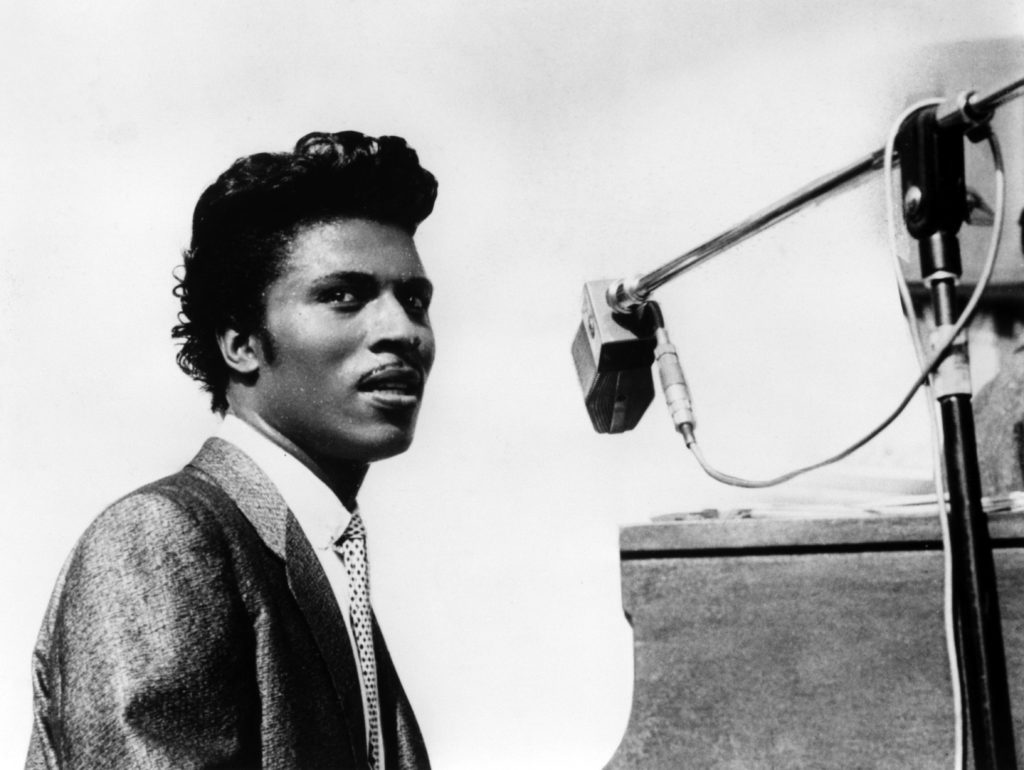Little Richard’s classic hit ‘Tutti Frutti’ was actually a graphic tribute to anal sex

Little Richard at the 1988 Rock n Roll Hall of Fame Induction Ceremony circa 1988 in New York City. (Sonia Moskowitz/IMAGES/Getty Images)
Richard Penniman, better known as Little Richard, once sang a little ditty called “Tutti Frutti” – a song which, at its core, captured the rhythms, euphoria and tribulations that all come with anal sex.
“Tutti Frutti” is that song we’ve all danced to in wedding receptions held in blank community centres, at fruit punch-filled high school proms and church picnics.
But as we all belted “a-wop-bop-a-loo-bop, a-lop-bam-boom!”, we were actually all cheerily jiving to a song once about graphic anal sex.
Penniman blended the sacred, bellowing shouts of the Black church with the woozy blues to create rock ‘n’ roll. His death Saturday sent seismic shockwaves across a world increasingly numb to devastation amid the coronavirus pandemic.
As countless dedicated fans and a new wave of listeners dust off vinyl records to listen to Penniman, some are looking back to “Tutti Frutti” and it’s rather raucous history as a song.
‘Tutti Frutti’ by Little Richard originally about anal sex: ‘You can grease it, make it easy.’
In the patchwork of claims about the history of the song, it was Penniman’s take of a short song he’d heard performed at nightclubs.
On September 14, 1955, Penniman, 22, hopped into a New Orleans studio to make his first recordings for Specialty Records.
The pressure was on for Penniman, after four years of trying and failing to make hits for RCA and Peacock Records.
Yet, none of his demo tapes seemed to capture his pounding-the-piano, swing-his-dripping-shirt-like-a-helicopter-mid-performance style.

Producer Bumps Blackwell called lunch, as the crew swung by Dew Drop Inn.
“Richard saw a piano and a crowd of people,” Blackwell recounted, according to The Guardian.
“He was one of those people who’s always on stage, and he hit the piano and hollered: ‘A-wop-bop-a-loo-bop-a-good-God-damn!’
“And those were the cleanest words of it.”
So, what were those “un-clean” words then?
Penniman was singing a ditty he’d heard performed as a filler in nightclubs before, where the original lyrics, according to Penniman’s drummer Charles Connor, ran like this:
Tutti Frutti, good booty
If it’s tight, it’s alright
If it’s greasy, it makes it easy
Although, some claim the original lyrics went something like this:
Tutti Frutti, good booty
If it don’t fit, don’t force it
You can grease it, make it easy.
The inn bar, of course, went wild.
Blackwell, Penniman and musician Dorothy LaBostrie then sanitised the song, with the lyrics then replaced with the slightly less about lust and lube:
Tutti Frutti, aw rooty
Tutti Frutti, aw rooty.
Moreover, soapy references to girls named Daisy and Sue were sprinkled in just for good measure.

And with a censorious swapping of booty for rooty, an uninhibited 10-syllable cry and three takes later, what has come to be ranked high in lists of music that uncompromisingly changed the world was made.
Within 10 days of its release, the tune, which was first dropped as a single before its album debut on Here’s Little Richard, had shifted 200,000 copies.
By 1968, it had sold three million copies in America alone.
“Tutti Frutti” was covered by unsuspecting straight male artists like Pat Boone and Elvis Presley
As was sadly common with rhythm and blues music in the 1950s, “Tutti Frutti” was quickly covered white artists like Elvis Presley and Pat Boone, who achieved even great success with the song – much to Little Richard’s chagrin.
In the documentary Little Richard: King and Queen of Rock’n’Roll, which airs on Saturday 22 April 2023 on BBC Two in the UK, the singer can be heard saying in archive footage: “Pat Boone came out singing a white version of “Tutti Frutti”. I was very disgusted, because I was just coming on the scene and he sold more than I did.”
In the same documentary, rapper Big Freedia, whose voice was sampled in Beyoncé singles “Formation” and “Break My Soul”, says of Boone’s cover: “I mean, you have this white, straight man that sing “Tutti Frutti” when he really don’t know the meaning of the song – and he made all the money, too.
“It’s just not right.”

